




Yes, uncomfortable as it may be, we do need to talk about consent. We need to talk about how to speak confidently and autonomously. We need to discuss the differences between consent and dissent. Leesa Waters, Deputy CEO at the National Association for Prevention of Child Abuse and Neglect reminds that ‘Schools cannot do this alone. Parents cannot do this alone. We all have to say we are committed to this because we want change.’
In the compliance culture that underpins conventional schooling and traditional homes, young people need opportunity to exert agency – not just in matters of sex but, from the earliest age, in general decision-making around choices that affect them, directly.
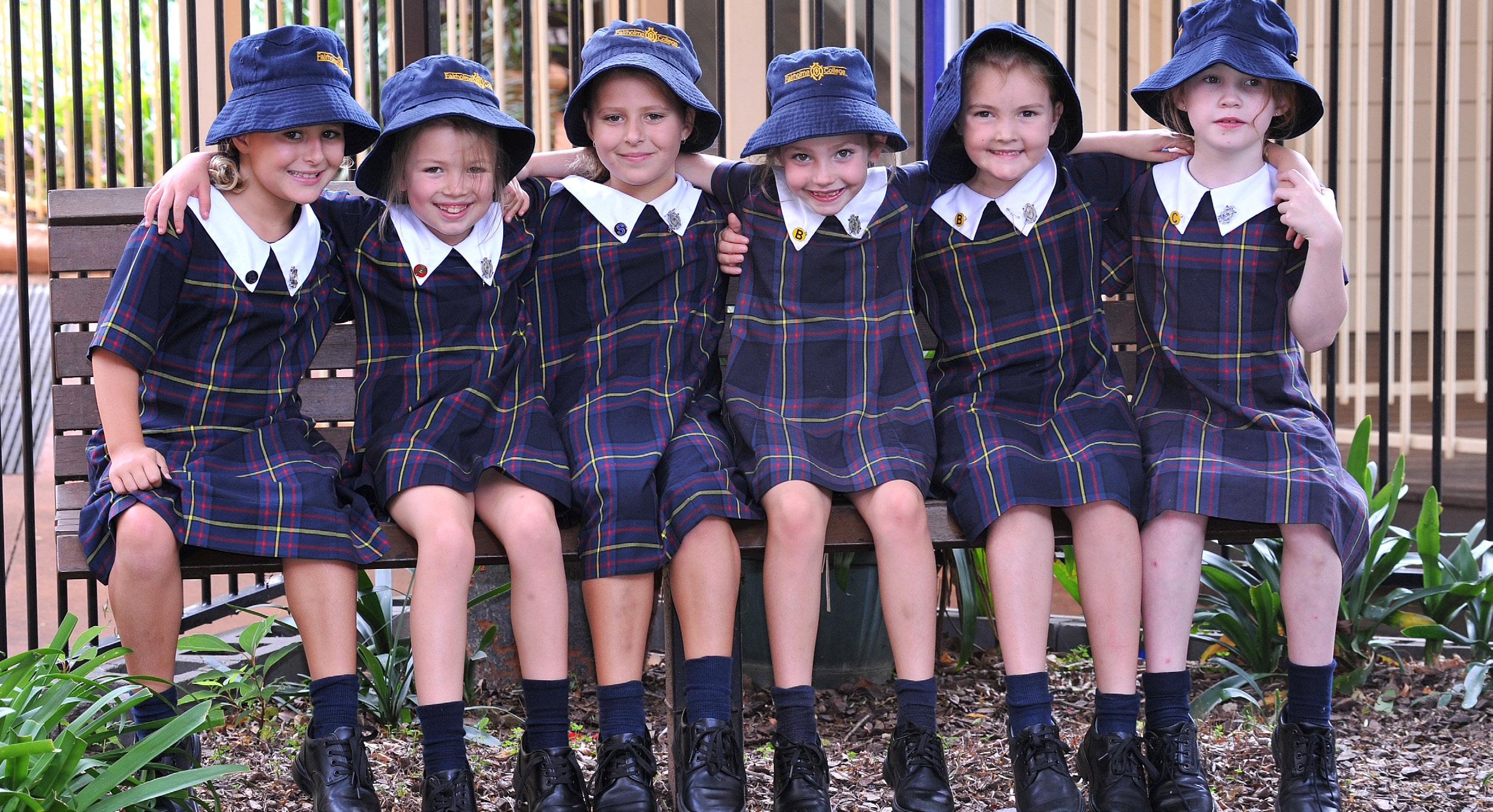
This is not just about being able to say no, it also about engendering the confidence to say yes. I have a memory of being twelve and driving home with my friend and her mother in their bronzecoloured Chrysler Charger. Her mother asked,
‘What would you like to do, Linda – would you like to come back to our house, or go straight home?’ The arrangement had been that we would see a movie and then I would be dropped home straight after. Her question was a departure from the script. I looked at my friend who offered no input – she was used to decision-making, autonomy, and agency. She seemed aligned with her mother’s thinking which was genuinely around this being my decision, not theirs. I replied, ‘I’d like to come back to your house if that’s OK.’ This may seem to be a trite example, yet, in my world, at that time, plans were parent-driven and generally adhered to. Power rested entirely with adults. I felt a small sense of liberation in saying yes, and, in that small moment, I was learning about decision-making.
Conversely, how easily do we say no? How easily do any of us step beyond that which is expected that which has been cultivated in a power discourse, and speak our mind? Recently, I was struck by a
We need to talk about...
conversation with a student whose co-curricular load is expansive. She spoke of another activity of interest, but also of her seemingly impossible time juggle. I asked, ‘How does the idea of saying no sit with you?’ Because we need to learn to say no in situations that are not high stakes, situations where it is safe to decline, because there will be circumstances, throughout our life, where it feels dangerous to say no, yet vital that we do. Having listened to both of Leonie Smith’s Digital Parenting sessions in the past week, I am reminded (how can one forget, really?) of the pervasiveness of the on-line world where agency is diminished, it would seem, as we click our way further into an image culture that is broader and deeper than us. Resistance to this lure takes skill. It does take an ability to self-regulate – to say no. So, our children need to start practicing from an early age - even in the most mundane of circumstances.
How often do you find yourself saying yes – agreeing to something or someone, when you would rather say no? Broadly, consent exists in places and spaces that have nothing to do with sex. Consent is about choosing agreement, negotiating outcomes, and resisting compliance in circumstances where you actually want to say no. I am not talking about our children declining to do tasks that help a home or school operate well. I am talking about the gaps we might allow in situations of choice – invitations to exert agency. Extrapolating further, this creates a practice field for exercising choice over our bodies. McClung (2022) in his article ‘How do you teach a primary school child about consent? refers to a line from a recommended book that states ‘Your body belongs to you, and you are the
boss of it.’ It’s a simple truism but an important one to reinforce.
Waters (cited in Dillon, 2021) says [that] children need to learn they have a choice in how they react to situations, so that when they are older, they do not resort to blaming someone else’s behaviour for their own actions. She gives the example about learning mutual consent through play.
Waters talks about how to assist your child to negotiate a play stalemate by saying, ‘It looks like they don’t want to play that right now. Why don’t
you talk to them about something you both want to play?’
Yes, teaching consent is about empowering agency in young people – in the words they choose, and in the way they confidently articulate yes, or no.
We need to begin conversations around respect from the earliest of ages and to allow our children opportunities for real decision-making. An openness to do so and a willingness to discuss that which is uncomfortable sets a sturdy platform for your child’s future self. It may be that these

conversations create the cornerstone of the strength to say no, or to say yes, in the most vital of circumstances. Developing an understanding of how to respectfully consent or dissent needs to form an on-going dialogue, and we need to talk about it – often, openly and from the earliest of ages.
Ewen, K. ‘Beyond the Talk: Teaching Your Kids About Consent.’ The Gottman Institute. https://www.gottman.com/blog/beyond-the-talkteaching-your-kids-about-consent/
Hendriks, J. (2021). ‘Consent isn’t as simple as ‘no means no’. Here’s what you need to know’. The Conversation. 24 Feb 2021. https://www.abc. net.au/news/2021-02-24/what-young-people-need-to-know-aboutconsent/13184494
Lubis, I. (2021). ‘Navigating the complexity of teaching consent’. Upstart. 11 May 2021. https://www.upstart.net.au/navigating-the-complexity-ofteaching-consent/
McClung, J. (2022). ‘How do you teach a primary school child about consent? You can start with these books.’ 23 September 2022. https:// theconversation.com/how-do-you-teach-a-primary-school-child-aboutconsent-you-can-start-with-these-books-190063
Millar, C. (2021). ‘Teaching consent to toddlers: ‘I’m happy we’re starting to have this conversation’’. The Guardian. 2 June 2021. https://www. theguardian.com/books/2021/jun/02/teaching-consent-to-toddlers-imhappy-were-starting-to-have-this-conversation
Northover, K. (2023). Porn and the ‘manosphere’: SBS series is tough to watch, but it’s must-see TV.
The Sydney Morning Herald. 12 April 2023. https://www.smh.com.au/ culture/tv-and-radio/jess-hill-wants-her-series-to-spark-a-new-sexualrevolution-20230407-p5cywh.html
Dillon, (2021). ‘Teaching consent to children: The joke is where it starts and rape is where it ends’. The Guardian. 21 March 2021. https://www. theguardian.com/society/2021/mar/21/teaching-consent-to-children-thejoke-is-where-it-starts-and-is-where-it-ends Accessed 18/04/2023
SBS On Demand. (2021). ‘Asking For It’: Episode 1 https://online.clickview. com.au/libraries/categories/11360639/videos/57805443/asking-for-itseason-01-episode-01?loginPrompt=false

The final touches are being put on the Toowoomba Grammar School and Fairholme College co-production of ‘Footloose’.



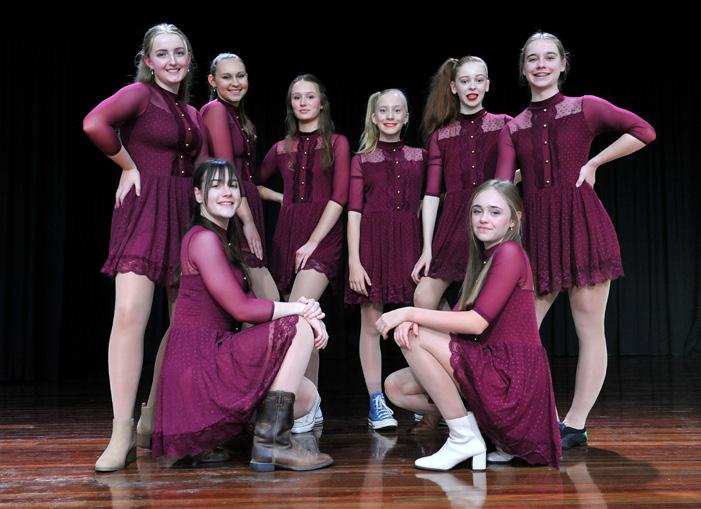
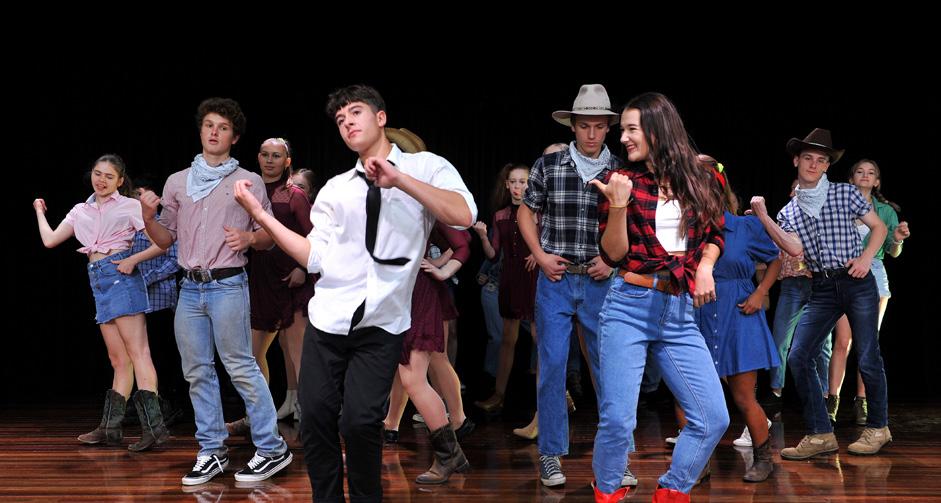
For those who may not be familiar with the story, ‘Footloose’ is a musical that tells the story of Ren McCormack, a teenage boy from Chicago who moves to a small town where dancing and rock music are banned. Ren is determined to change things and bring music and dance back to the town, and in the process, he falls in love and learns important life lessons.
We’re sure audiences will love the energetic music and dance numbers, as well as the heartfelt story and characters, all performed by our talented students.

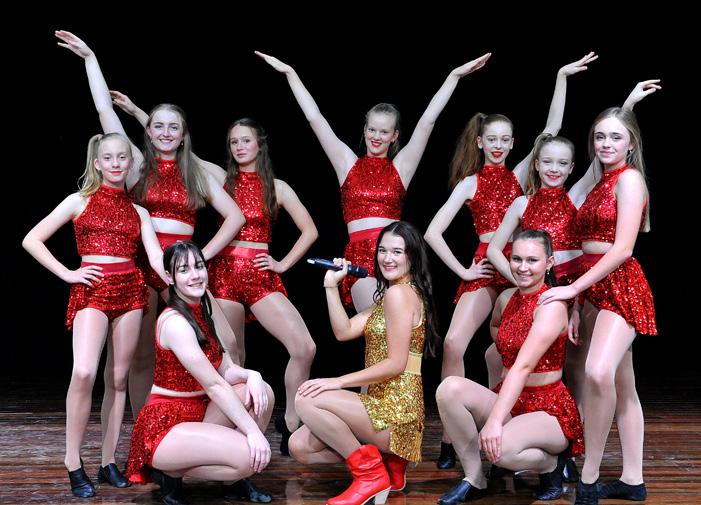
If you are interested in attending either shows on 1 and 2 June, be sure to get your tickets soon before they sell out! Tickets can be purchased online, www.empiretheatre.com. au or from the Empire Theatre Box Office.
Please note the musical is rated PG and be aware there are a few instances of coarse language.

Inspired by tales of mountaineers and explorers who dared to conquer the world’s highest peak, Senior School student, Lilli Hamilton, resolved to embark on her own adventure, showcasing her indomitable spirit and the empowerment of female adventurers

In a world where breaking barriers and defying expectations has become a norm, one young Fairholme student has embarked on an extraordinary adventure that few will ever conquer. Meet Lilli Hamilton, a fearless and determined Year 10 student who recently trekked to the majestic Mount Everest Base Camp, proving that the mountains are no longer just a domain for the privileged few. Her aweinspiring journey serves as a reminder that perseverance and passion can lead to the achievement of even the loftiest goals.
Lilli’s fascination with the great outdoors and her unwavering desire to push her limits were the driving forces behind her decision to take on the monumental challenge of trekking to Mount Everest Base Camp. ‘I wanted to do it originally because it has always been on my bucket list and I wanted to challenge myself to see if I could actually do it,’ Lilli explains. ‘I also wanted to experience another country, especially a third world country, and learn about their culture.’
Months prior to her departure, Lilli - who completed the challenge with her mum - prepared herself physically and mentally for the journey that lay ahead. She adopted a fitness regime, incorporating endurance training and long hikes to build her stamina and
endurance. ‘I just tried to maintain a high level of fitness and did short hikes around Australia.’
Lilli’s expedition started in Kathmandu in early April where she flew to Lukla, a small town situated at 2,860 meters above sea level. ‘It’s the world’s most dangerous airport!’ Lilli said.

From there she embarked on the challenging trek, navigating through rugged terrain, crossing suspension bridges, and passing Sherpa villages. As she ventured higher, the thinning air and steep ascents tested her physical and mental strength, but she remained resolute in her pursuit of reaching Everest Base Camp. ‘We hiked for around eight days to Base Camp and then five days back to Lukla. I was very excited going into it, but when we started climbing, it was really difficult, which made me nervous for what was still to come. Overall though, it was a great experience and I would totally recommend it!’
Along the way, she encountered fellow adventurers from different corners of the globe, forming connections and sharing stories.
To us, Lilli’s remarkable achievement was all about challenging societal norms, breaking free from limitations, and embracing a wholly unique quest. However, for Lilli, it was all about ticking off her bucket list...

How long have you been a gymnast? I have been a gymnast for seven years.
How many days do you train? I do seven sessions a week over five days.
What do you training sessions look like? A usual training session would be a 15-minute warm up then 45 minutes strength and conditioning then typically another 2 and a half hours of apparatuses.
With that amount of training, how do you fit it all in? Now it has almost become normal. I try to be as organized as possible like preparing for everything on Sunday but (I end up staying up late little to getting everything done).
How do you relax? I try to schedule time to relax, for example I have one day a week, which is normally on a Sunday where I do my best to chill out and spend time with family and friends.
Why do you love it? I like gymnastics because it makes me feel like I am flying and makes me happy.
What was the experience like at the Gymnastics State Champs? This year was my first year going to senior level states and was a great learning experience for me.
What level are you currently and how hard was it to get to that level? I am currently in level seven, and it probably took me six years to get to that point in gymnastics.
Who inspires you? Someone who inspires me is Mikayla Skinner who is an American gymnast who, despite a reserve twice on the Olympic team, never gave up and reached her goal.

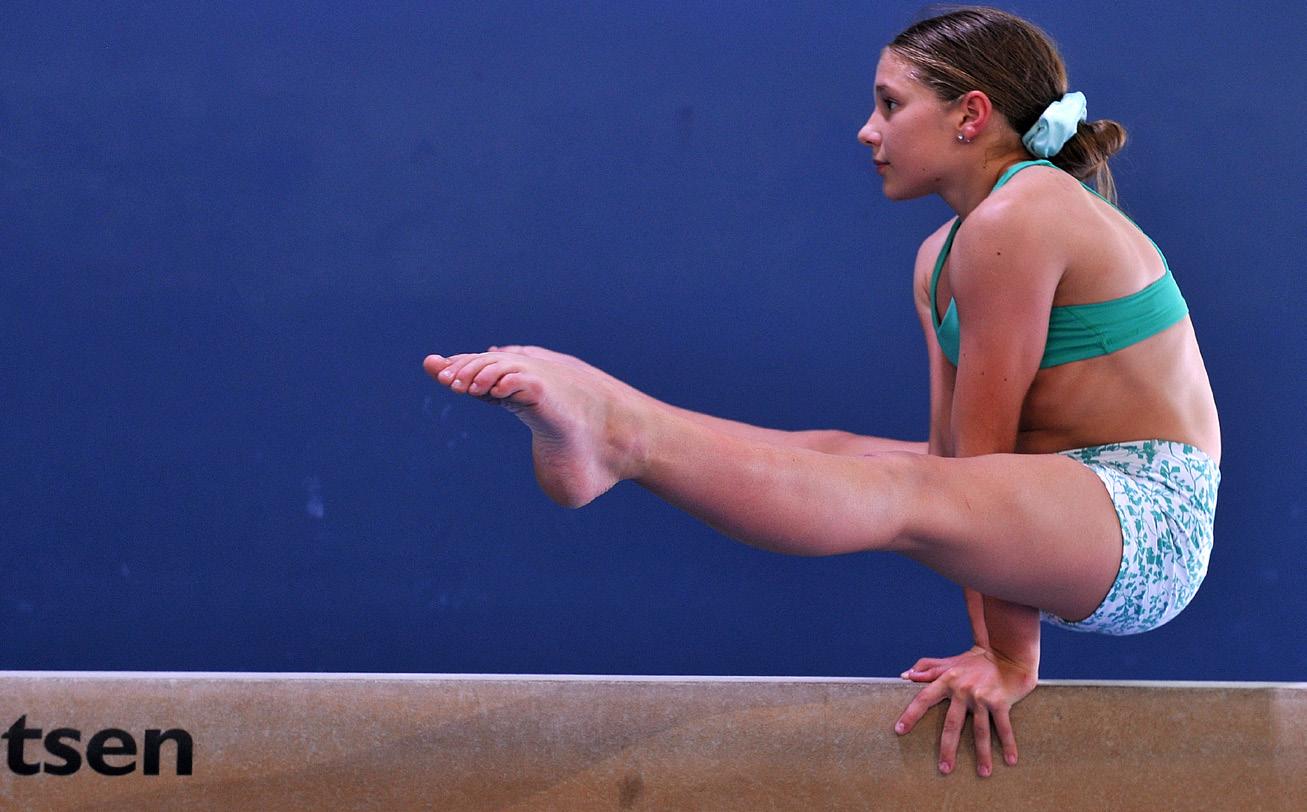
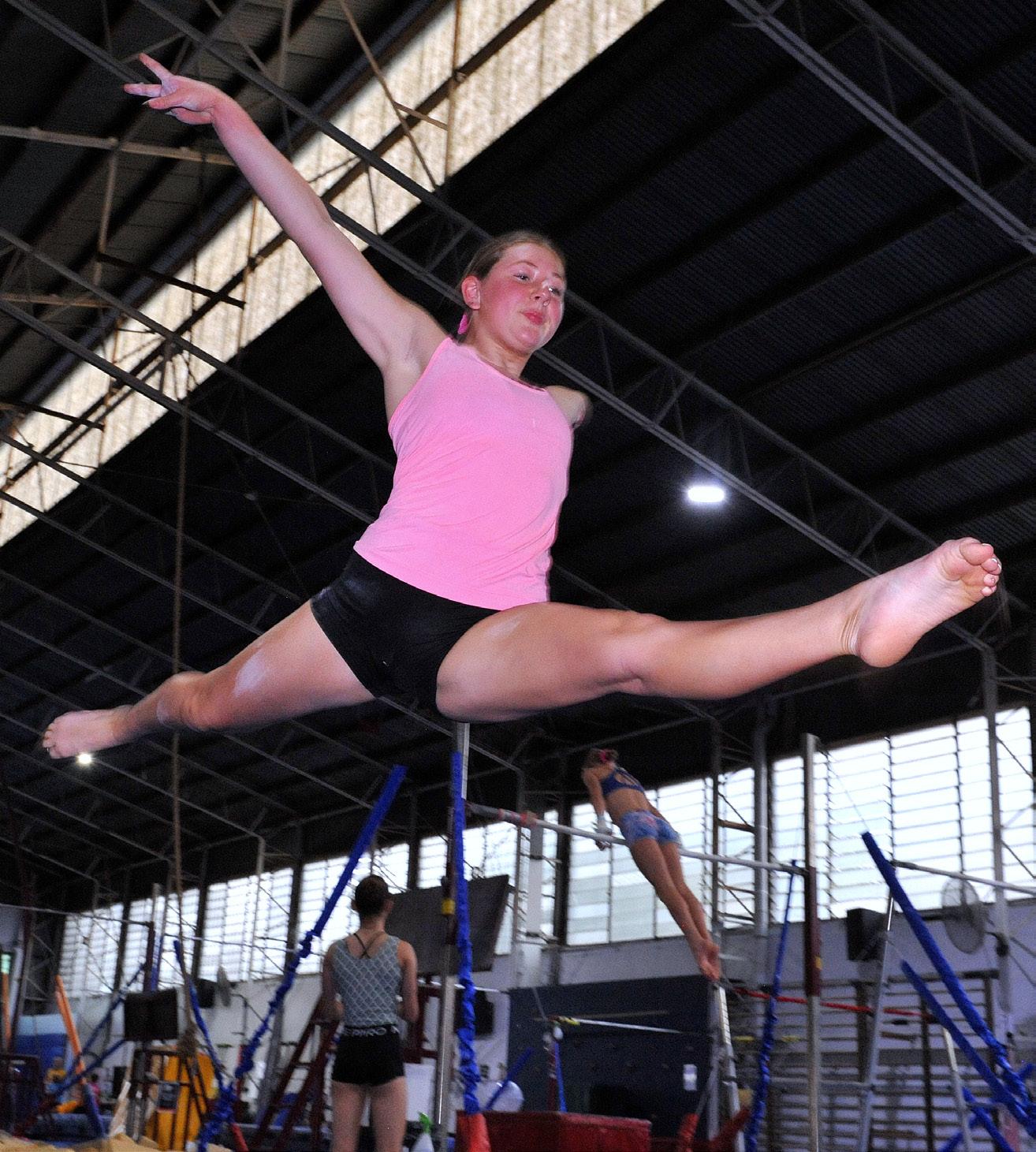

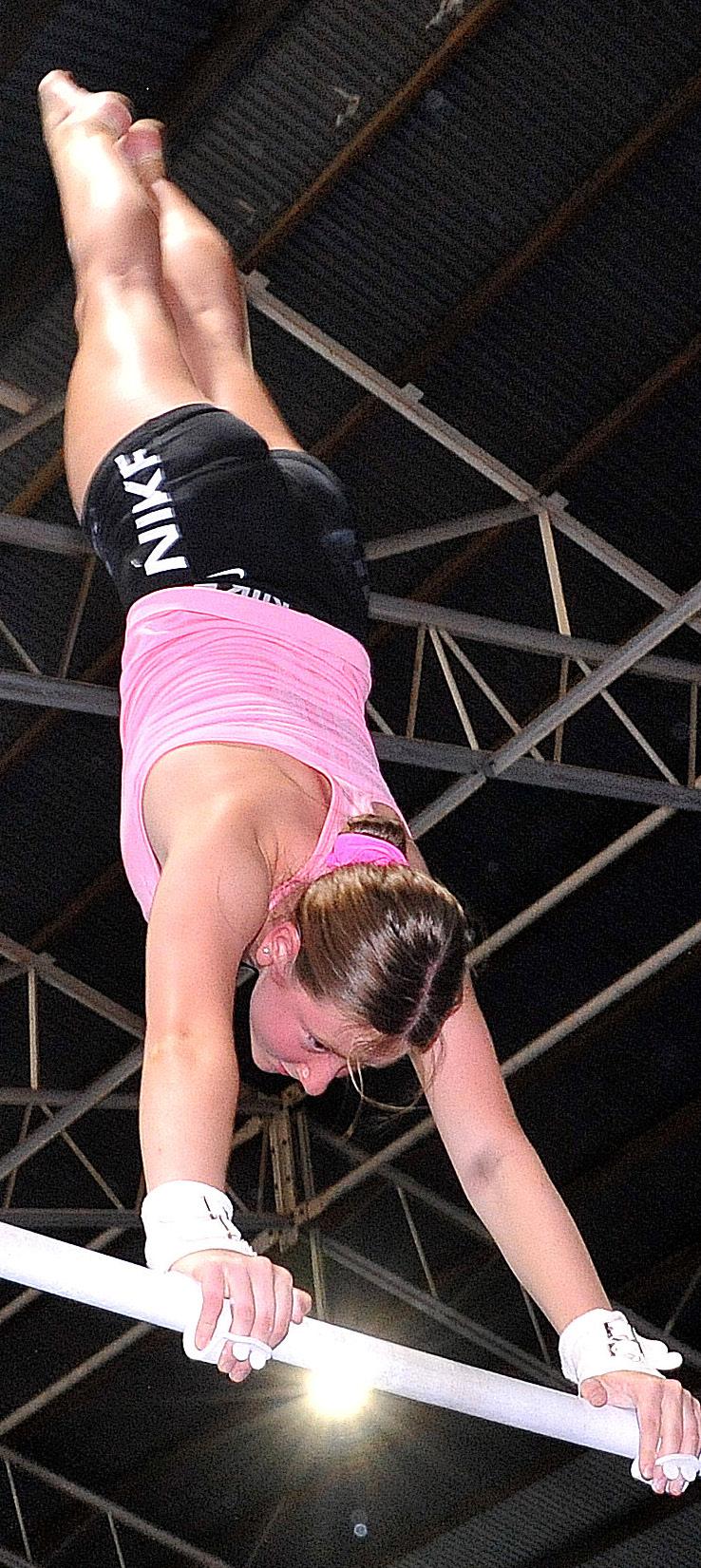
As the 2023 Arts Captain, Maggie Lattimore, has a passion for art that goes beyond the classroom. She spends hours experimenting with new mediums, striving to push the boundaries of her creativity. Here she talks about her passion for art, her love of lino printing and who inspires her...
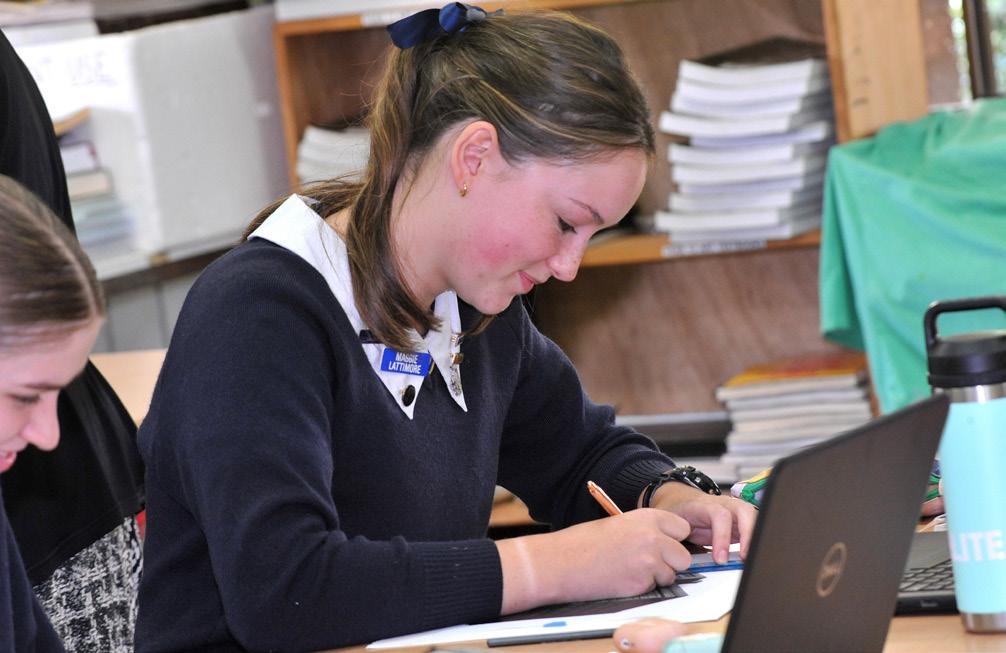
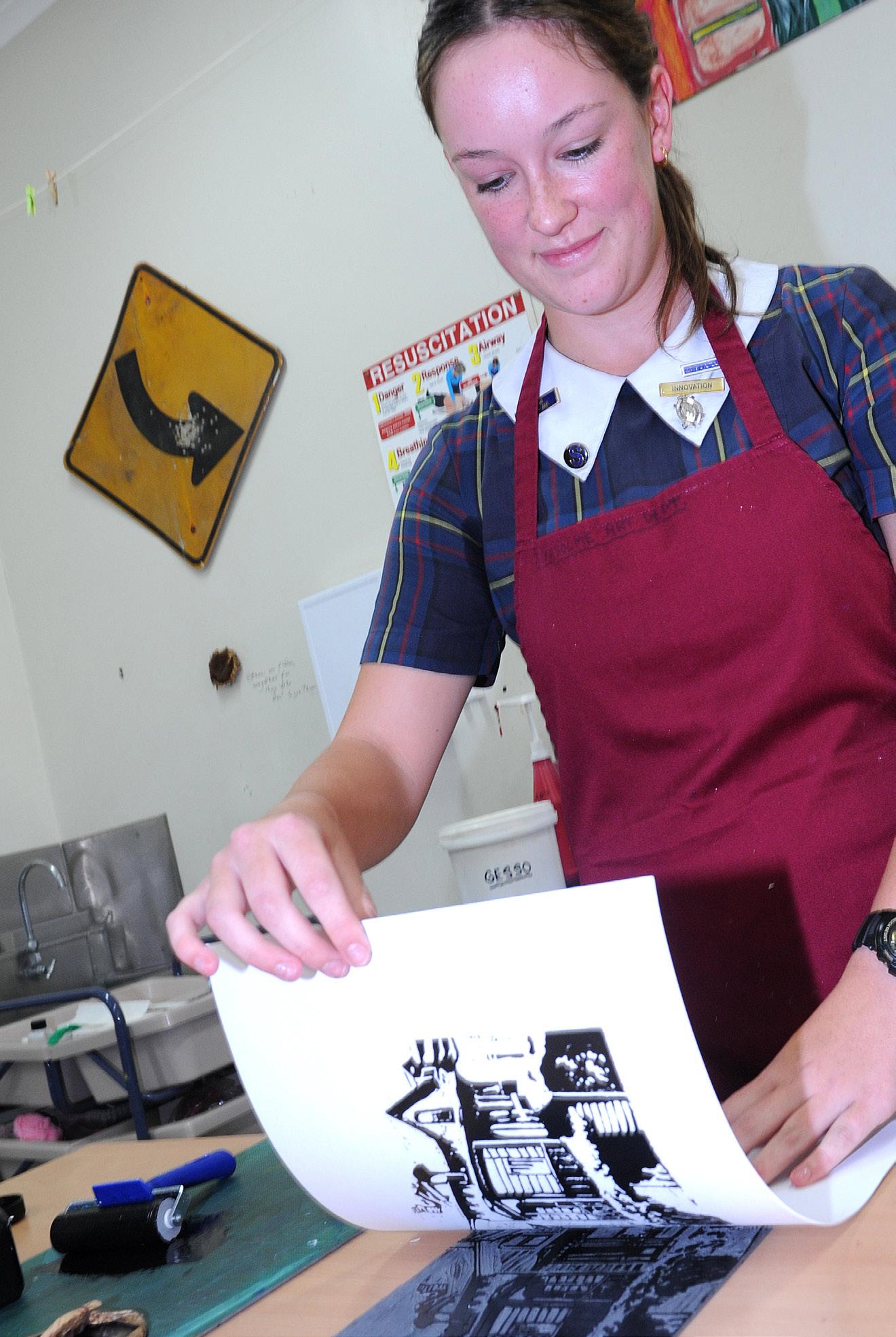
I have always been attracted to all forms of art. I used to read a magazine, Teen Breathe, and the colour and design within its pages really captured my interest. More recently, I have been drawn to the lines and balance in architecture from travels near and far.
I’m particularly inspired by Rhi Johnston, a local Toowoomba artist who works primarily in print making. She lectures in printmaking at USQ and has exhibited nationally and internationally. She creates incredibly detailed prints with multiple stages and colours, I would love to learn more and develop my skills to create works Iike this style.
I fell in love with Lino prints in Year 10 Art. My first lino print was of a beautiful hotel when visiting Paris. It was a four-step reduction print; I had no idea how challenging this would be! You start by printing the entire image in one colour, then cut away parts of the lino to introduce subsequent colours. The prints have to be precisely aligned each time, with the choice of colours adding dimension and perspective to the print. You never really know what the final image will look like.
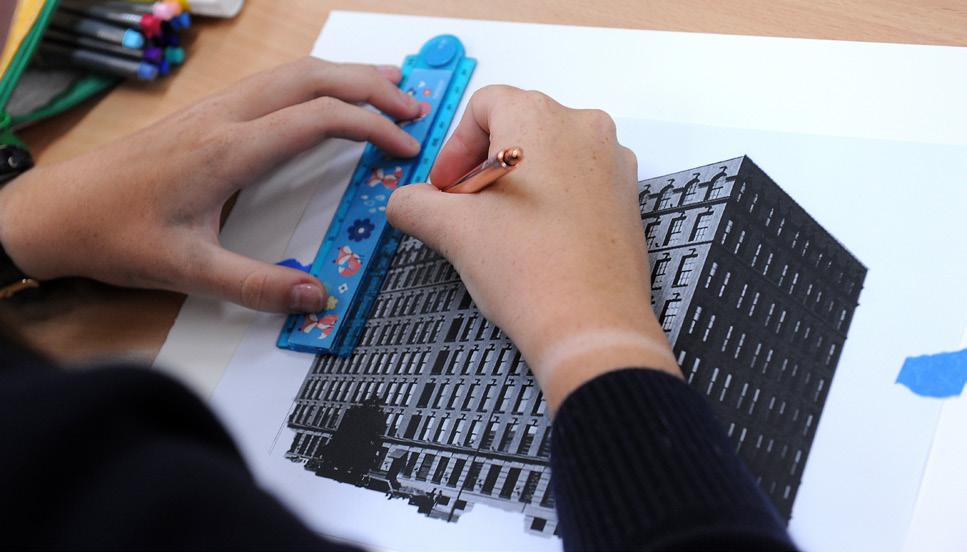
The Fairholme Art program has shown me the possibilities of the art world.
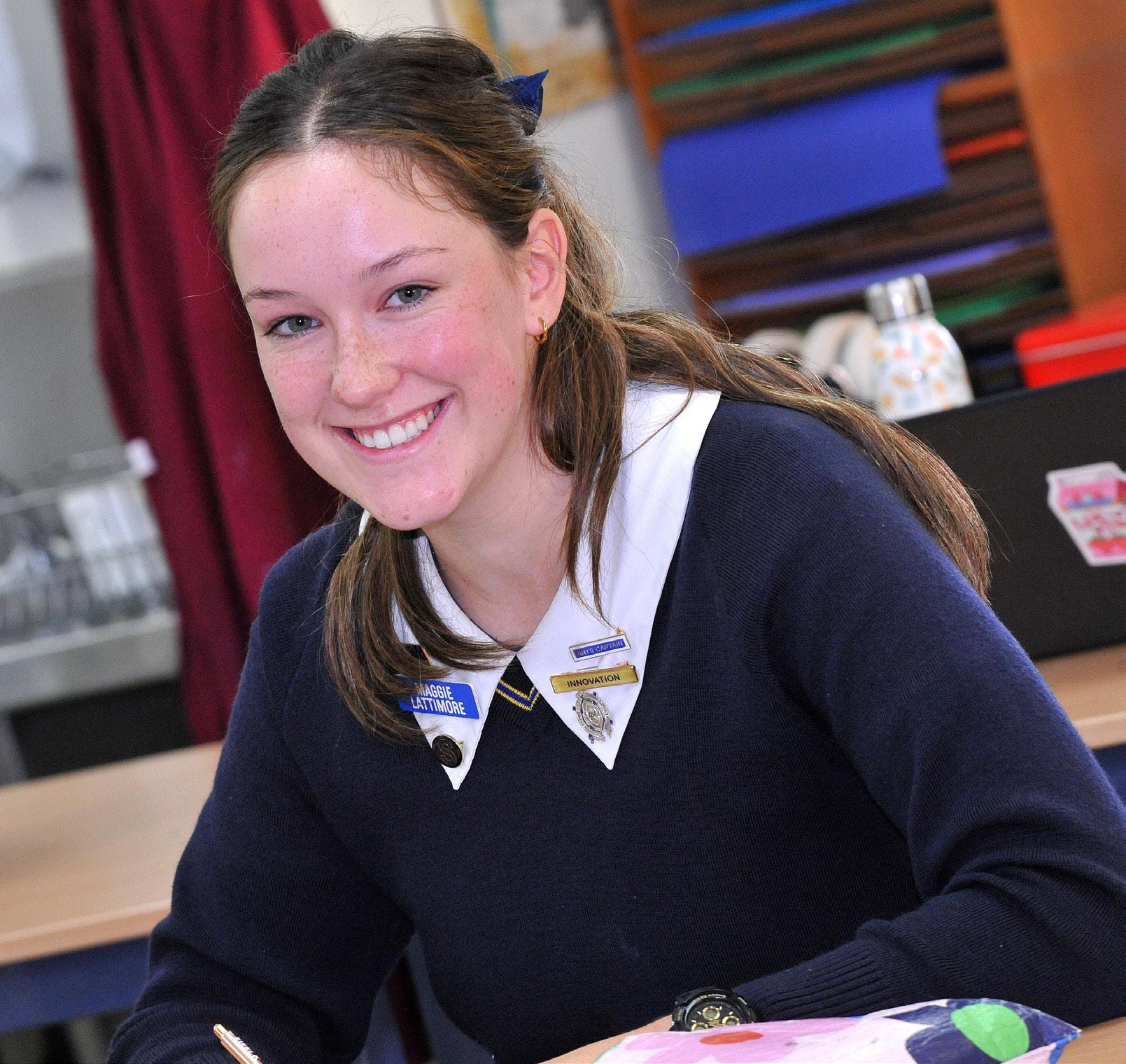
We have studied all sorts of artists, theories, styles, techniques and mediums that has allowed me to find where my interests lay.
Mrs Hayward has been a constant during my time at Fairholme and a hugely supporting and guiding influence. Her dedication to the arts is truly inspiring.
I look forward to Facets every year! Even before I exhibited, I loved having the opportunity to be exposed to a variety of artists and their specialised mediums that require so much skill and knowledge.
The artists that are chosen to exhibit create the most stunning pieces. I love how Facets brings our community together to celebrate regional art. I have a real appreciation for the skill local artists bring to their mediums.

The work behind the scenes to bring an exhibition together is phenomenal and deserves all the attention it can muster; I highly recommend coming if you are interested!
Facets is a great opportunity for art to be shared and I am so proud to be a part of it. It takes courage to share your work with others.
I hope that creating art will be a life-long interest. I am interested in pursuing graphic design, architecture, or visual communications, possibly mixed with a business degree. Creativity is not something you can force, and I hope to find an outlet that allows me to continue to develop as an artist.

Many parents would be aware of the warnings about the early years of adolescence. We are told these are the years where hormones go crazy and there are big mood swings, but in my experience as the Head of Middle School at Fairholme, it is also a time of excitement because it is when they start to change from children into the young adults they are going to become.
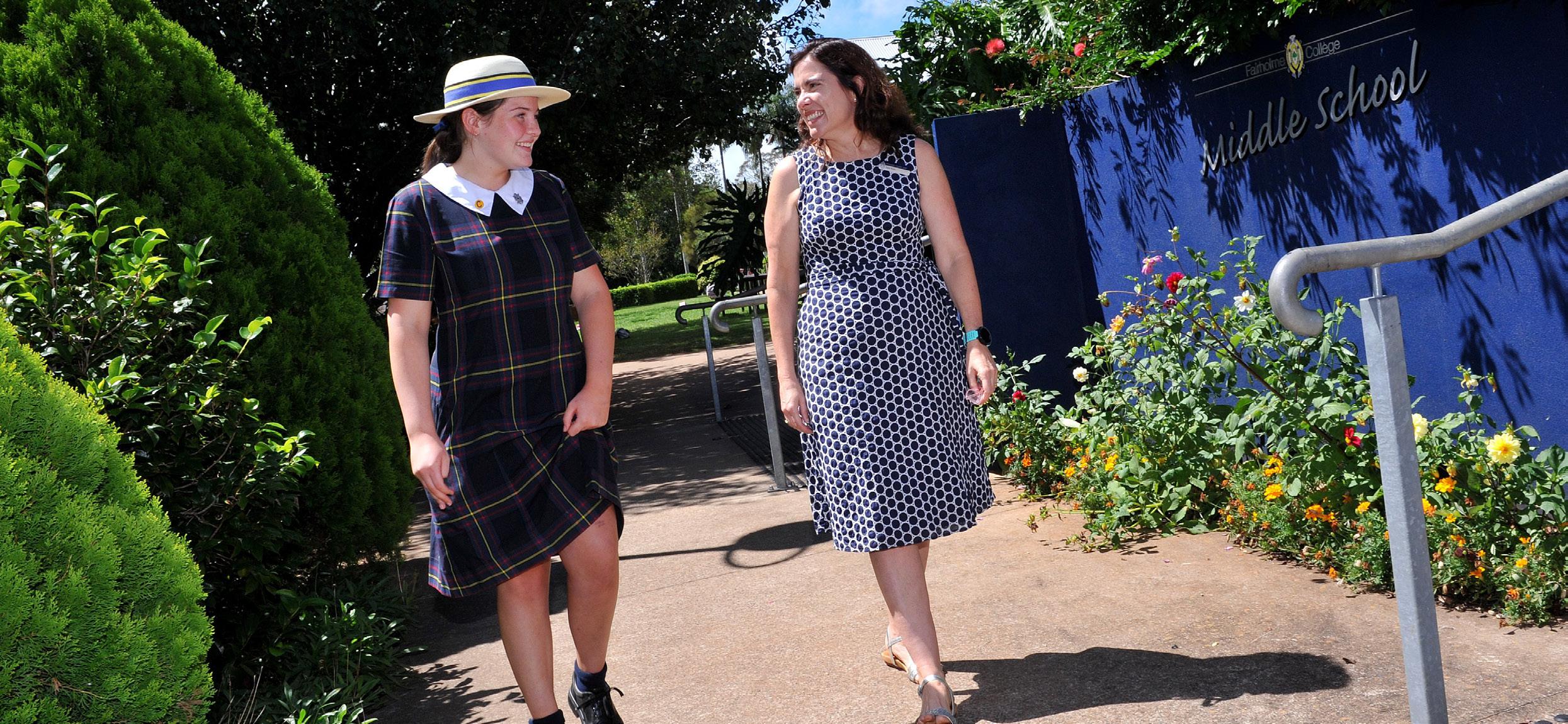
They begin to realise what is important to them, and they think about who they want to be and what is worth spending their time on and it is when they decide which parts of themselves they are willing to leave behind in childhood.
It is probably when they will first fight for something they believe in and it is when they will first be devastated by a relationship breakdown with friends or family members.
In short, they are challenging
years but the challenge is worth it because out of these years comes the young adult version of themselves and that is an marvellous time to be a part of someone’s life whether that is as a parent or other family member or as a teacher.
So, how do you enjoy and make the most out of your daughter’s years in the Middle and how can you support her so she learns to make safe and healthy decisions for herself?
Here are a few tips I’ve picked up over the years:
> Put boundaries in place for their social media use and screen time but allow these to stretch slowly each year as they grow towards the ages of 16 or 17. Start as tight as you can manage when they
first receive a phone and make decisions together about how each year these restraints can be slowly lifted as they mature and are more able to manage their own time on technology.
> Stay involved in sport and hobbies and show an interest in what they are interested in. Keeping them busy and engaged with others helps them to stay connected and able to continue to build connections with their school and peers.
> Keep your praise focused on their efforts and commitment to things rather than about their actual results or success. This is true for academic results as well as their success in Sport or The Arts. This helps to curb any tendencies towards perfectionism and also decreases their stress levels and anxiety about having to succeed to please their parents (or teachers).
> Try really hard not to solve all their problems for them or to rush in to make their path easier. When parents take control of a situation, the message the child receives is that their parent thinks they can’t manage it on their own and aren’t capable of solving the concern. Try to give suggestions for ways they might tackle the challenge without stepping in and doing it for them. The amount of learning they get and the sense of achievement they feel when they succeed in solving a problem is enormous – resist robbing them of this opportunity.
> Give them responsibilities at home. This helps them learn that we all contribute to looking after ourselves and the home we live in and that this job does not just fall to the adults.
Even when they are busy studying and working, adolescents need to learn skills like cooking, cleaning, washing, ironing, mowing, washing the car etc. They will soon be doing these things after school finishes and it will help them enormously if they are already used to these responsibilities.
> Encourage them to do regular study, homework and revision and make sure there is time in their schedule. Although sport and hobbies are important, it is always more important to ensure they have a focus on learning. Show an interest in what they are doing and offer to read over assignments but resist taking the pen in your own
hand to make significant changes. If you give too much input you will send them a message that you think they can’t do the work.
> Keep them reading! Suggest books for them and buy books for them. Read books yourself that you think they might like and then pass them onto them. It is so important for mental health but also their literacy development.
> Keep them exercising and eating a balanced diet. Make sure the focus is on their physical and mental health and not about their weight or appearance.
probably hoping that she will have a strong work ethic and understands the importance of fulfilling responsibilities – attending school every day will help her to learn this approach to her adult studies and work places.
> Encourage their friendships by asking their friends over to your home as often as you can on weekends and holidays. Having solid relationships with her peers will help her self-confidence and so do your bit to give her opportunities to solidify these friendships by spending time together outside school. Weekends and holidays are
> Prioritise time at school. Make every effort for them to be at school every single day that school is on. Every aspect of school is important including sports carnivals and choral competitions and last days of school. These sorts of events are golden opportunities for your child to feel a part of their wider school community and to connect with their peers and teachers. Every lesson has learning in it and so try hard to only book family trips in the holidays and minimise appointments during school time. At this age, school is your daughter’s job and you’re
busy times for families but make sure there is time with friends in the mix.
> Encourage her to spend time with extended family. Having strong bonds with people you trust will help her when your relationship with her is strained.
> Above all, tell your daughter that you love her just as she is including all her amazing strengths and also her weaknesses.
Enjoy the years your daughter spends in the Middle School. These years can be absolutely marvellous!
‘The amount of learning they get and the sense of achievement they feel when they succeed in solving a problem is enormous – resist robbing them of this opportunity...’
Our Boarding House is more than just a place where students reside. It’s a community, a family away from home, for 215 students who hail from all areas over the country.
Acting Deputy Head of Boarding, Mrs Kylie Wallis, had a brilliant idea to showcase the diversity of the land where each of our boarders come from.
A giant jar was filled with a collection of dirt from the different regions, which is now on display in the Boarding House.
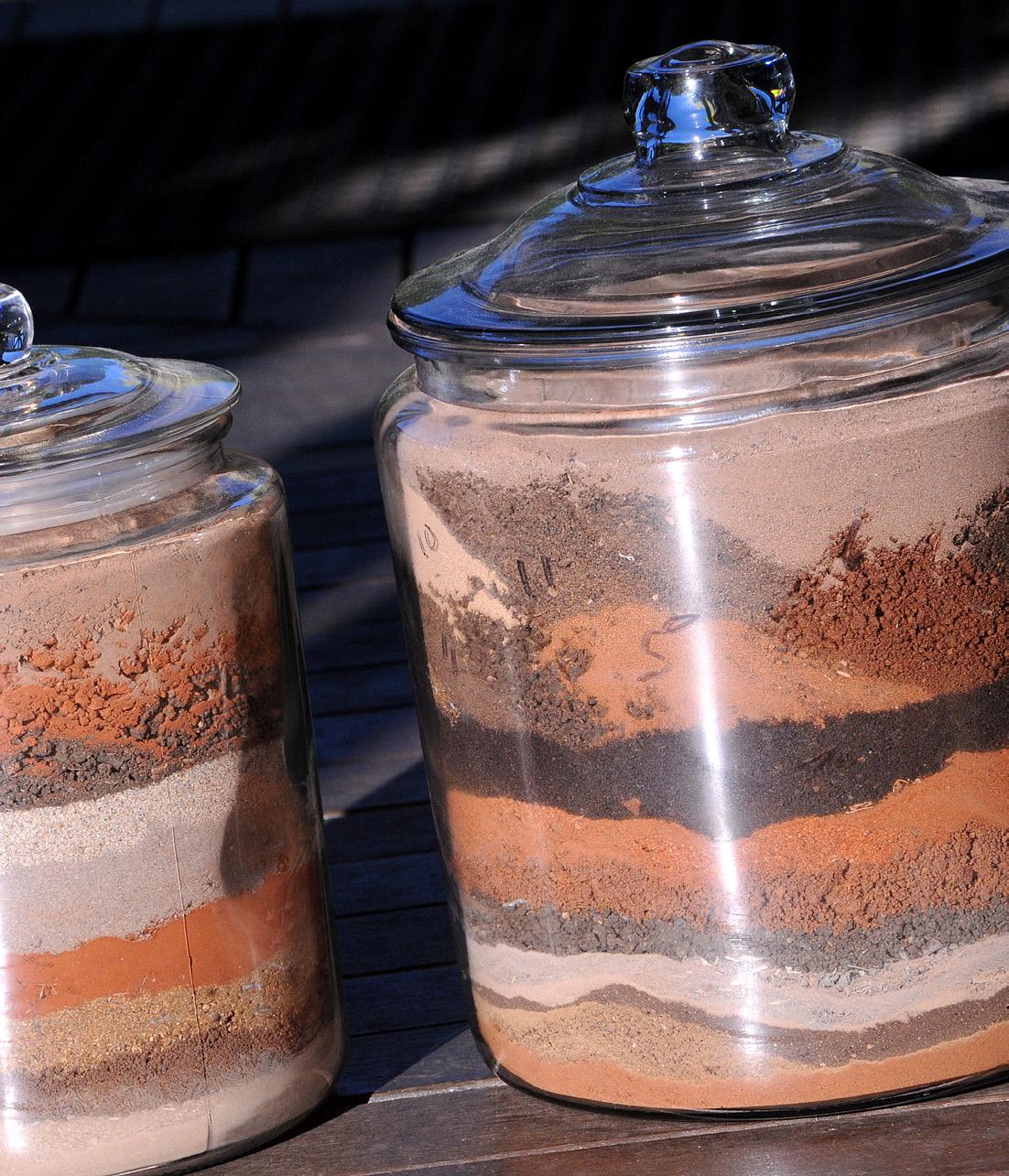
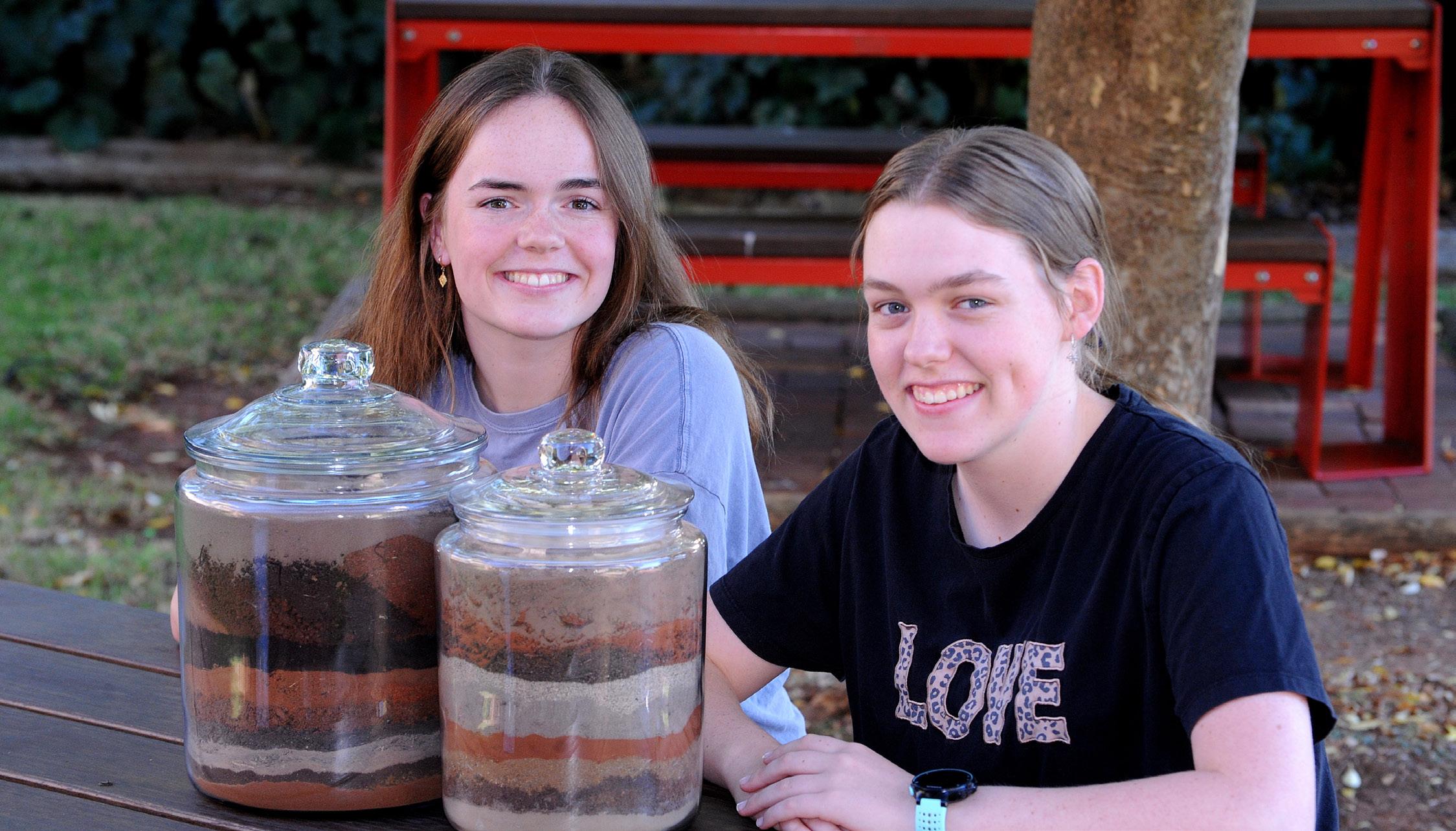
The dirt has literally come from far and wide around Australia – with the furthest sample being sourced over 3000km away in Katherine, NT.
The visual representation became more than just a jar filled with earth. To the boarders, it represented a tangible connection to their homes.
Mrs Wallis says they realised that their individual identities were intrinsically linked to the land they came from, and the display of dirt became a celebration of their diverse heritage.
‘They would often gather around the jar, sharing stories and reminiscing about their hometowns, fostering a deeper understanding and appreciation for one another.
Some even started conversations about their own
cultural backgrounds, leading to greater appreciation for Australia’s diverse geography and the importance of embracing one’s roots.’
The dirt will remain on display in the Boarding House and there are now plans to fill another jar.
As part of our ongoing commitment to partner with you in raising confident young women who are able to engage in the world with purpose, Fairholme offers parents information about Digital Wellbeing and Cyber Safety through the Online Safety Hub linked to the Parenting Resources section of the Parent Portal (on myFairholme).

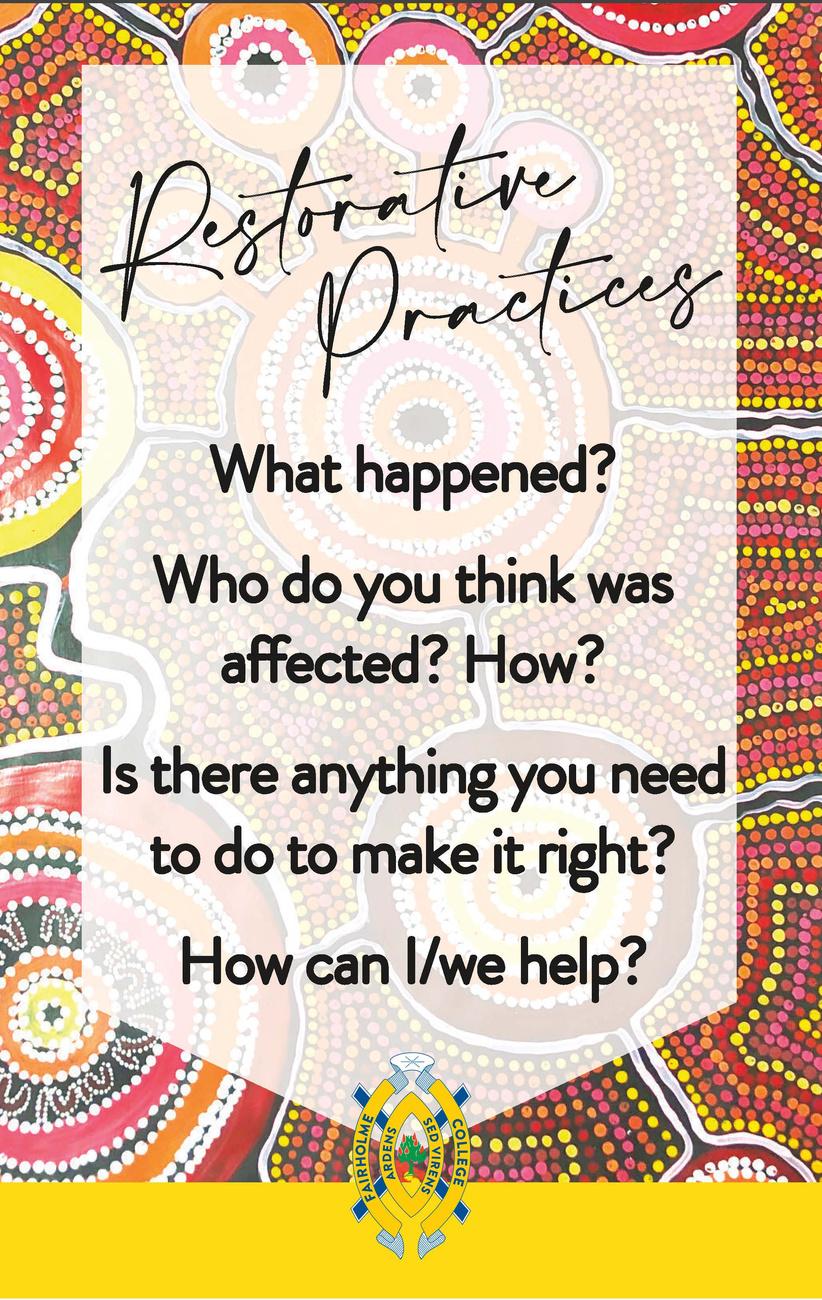
Through this hub, you can access up-to-date information about the latest apps, online safety technology and parental controls.
The Online Safety Hub supports the school community by providing practical insights and advice directly from internationally renowned Online Safety & Digital Wellness Experts.



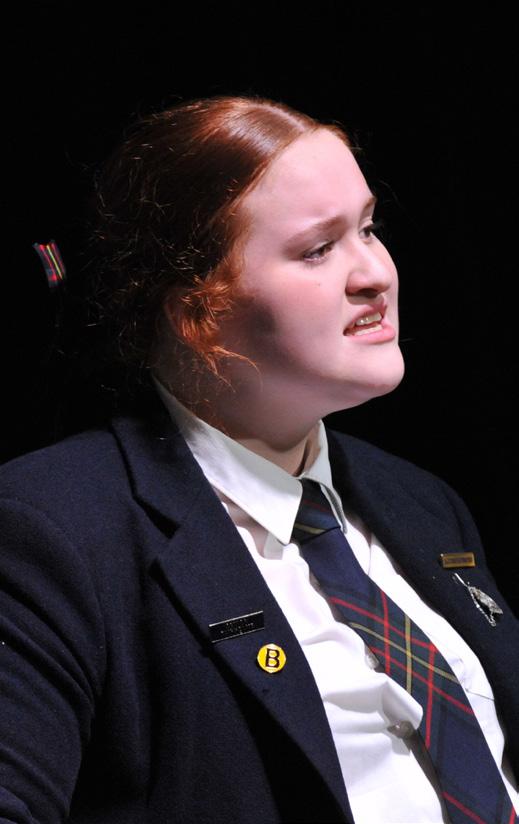


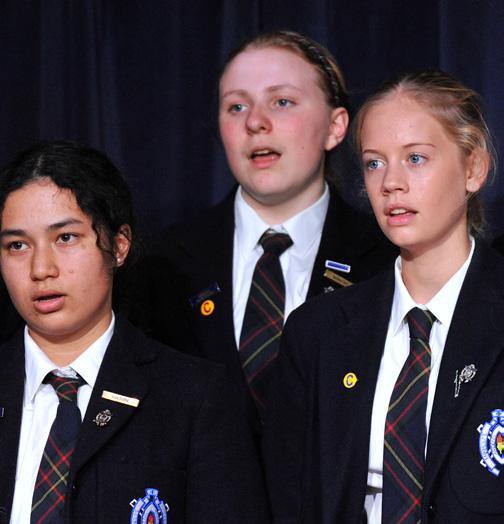
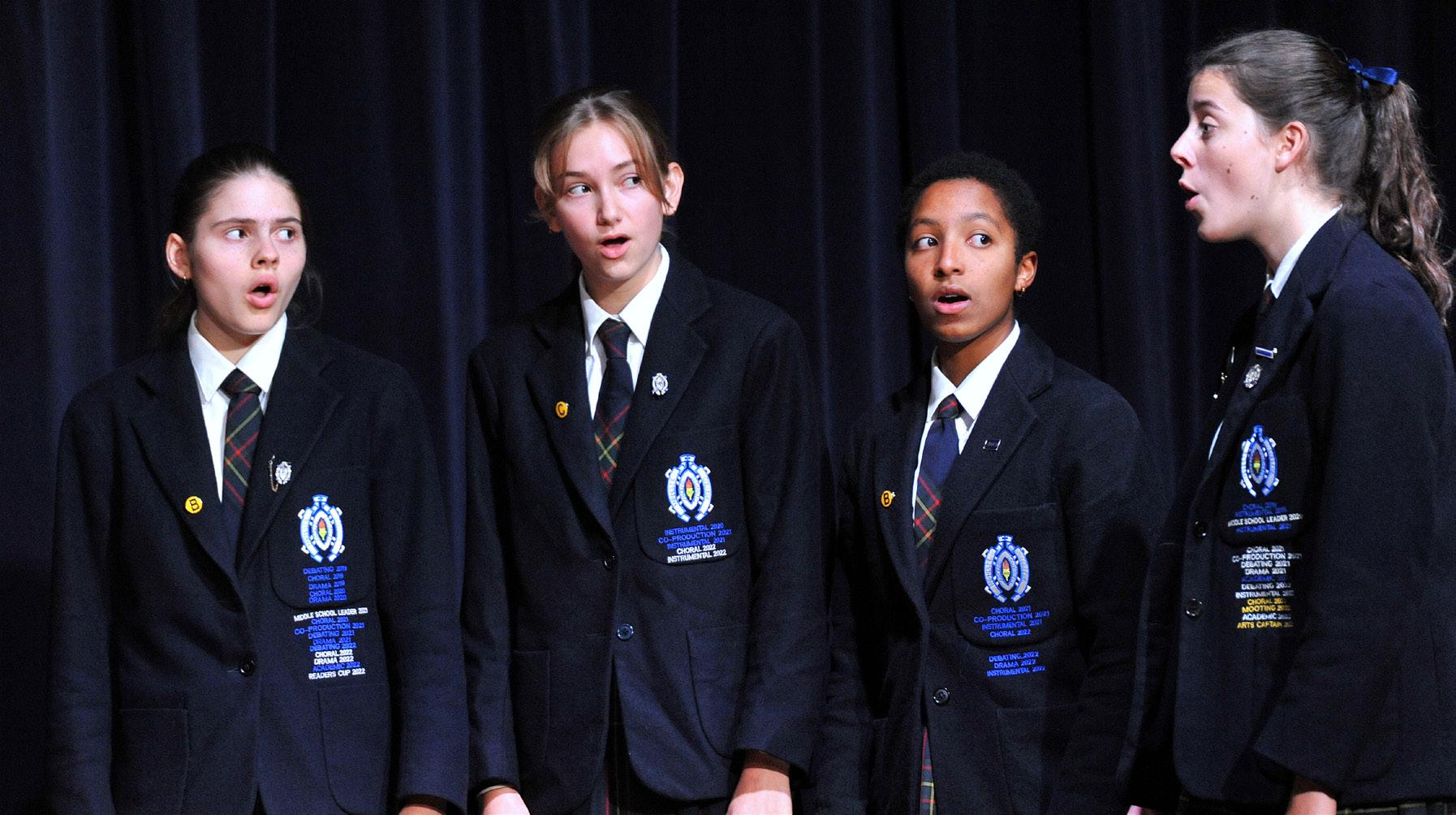

Congratulations to all of our talented students who represented Fairholme College in the recent Eisteddfod competition!
The Junior Chorale gave a stunning performance and secured Third Place in the Primary School Modern Section.

Our Years 3/4 and 5/6 Class Choirs did an outstanding job, taking home Second and First place respectively in the Primary School Choir sections. This was the first time our Class Choirs have competed at Eisteddfod.
A special thank you to Mrs Natalie Rawle, Mrs Elizabeth Egan and the Junior School staff for their unwavering support of our students involved in the choirs.
Our newly formed, co-curricular Drama Group, ‘CentreStage’, won their section. The girls delivered a stunning performance and were presented with the trophy for Dramatisation of a Poem – Group and were awarded the highly competitive score of 89.5. The group meets each week under the direction of Katrina Bailey, Andrea Hohn and Karen Wighton and,
quite rightly, these staff are incredibly proud of the ensemble’s performance and thrilled with the result.
Individual Vocal Music achievements were also celebrated, with Ayesha Saleh winning First Place in the Year 10 Music Theatre Performance Solo for her beautiful rendition of “I’m Here” from The Colour Purple.
Year 11 student, Hannah Pocknee, was awarded the John Penny Memorial Trophy for achieving the highest aggregate points in the Years 11 or 12 Vocal Solo, Years 11 or 12 Music Theatre Solo, and Years 11 or 12 Australian Composer Solo. She also placed 1st, 3rd and 1st in these categories, respectively, and also came 3rd in the Years 10-12 Vocal Championship.
Our Senior Voices were awarded second and third place for their beautiful performances in the Secondary School Hymm Singing sections, while our Chamber Choir was awarded second place for its emotionally-engaging, un-conducted performances in the Secondary School Folk Singing section. Well done to our all of our performers!
Fairholme Boarders travelled hundreds of kilometres to compete in the Winton Campdraft recently, and their dedication paid off.

Meg Logan, Liv Hawkins, and Ava Hawkins, competed in the campdraft, and all performed exceptionally well.
Meg Logan won the Juvenile Campdraft, which is a competition for riders under the age of 17.
Liv Hawkins came in second place in the same category, while Ava Hawkins won the Junior Campdraft, which is for riders under the age of 13.
Congratulations girls, well worth the 700-kilometre trip! Meanwhile, Fairholme musician Leora Dowling, was recently awarded the People’s Choice Award at the Toowoomba Busking Festival.
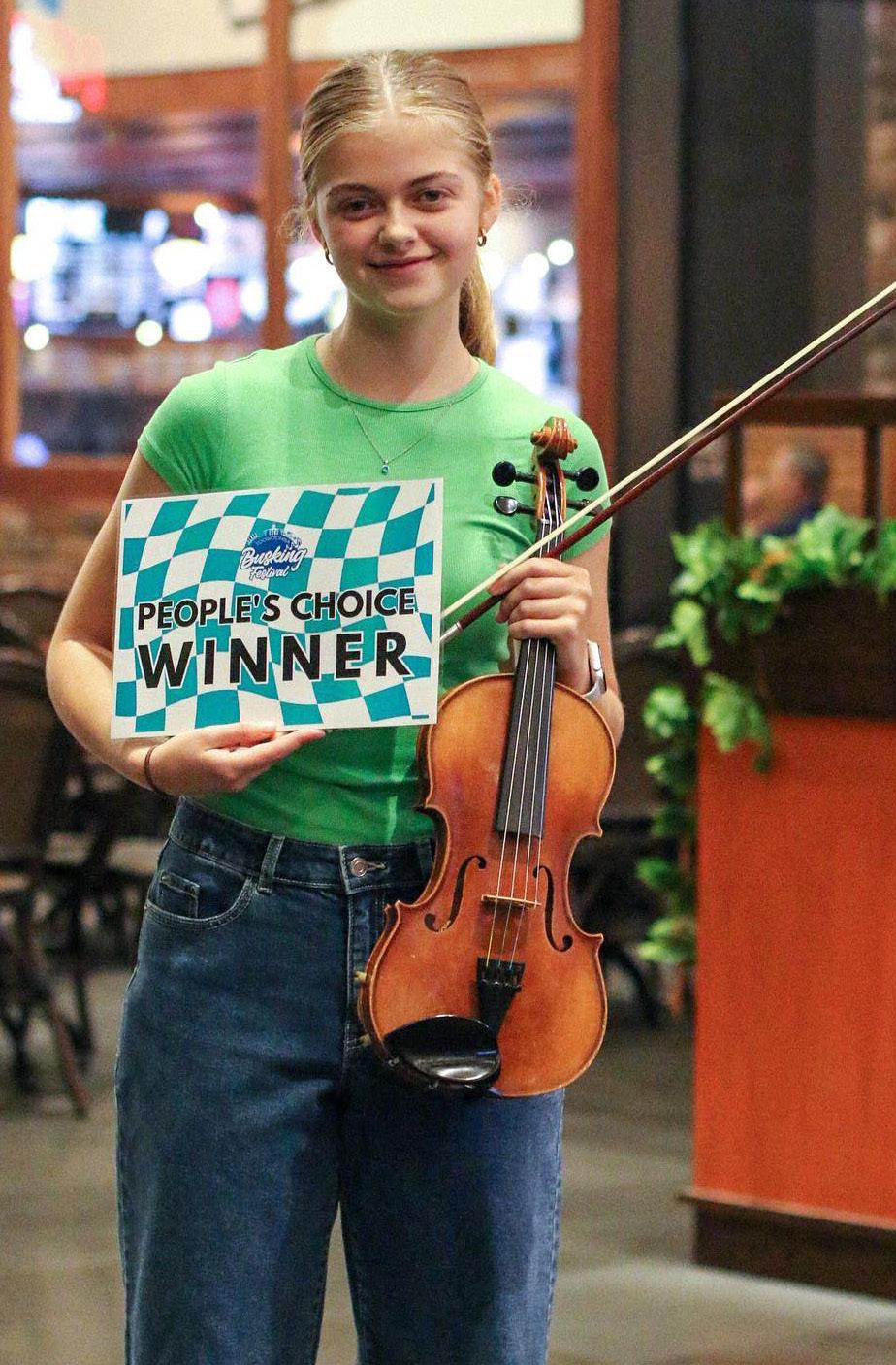
The festival, in the heart of the city, saw dozens of talented performers from across the state take to the streets to showcase their musical talents.
Leora, who is an accomplished violinist, wowed the crowds with her impressive skills and captivating performances.
The People’s Choice Award, which is based on votes from the festival audience, was a fitting recognition of Leora’s dedication to her craft. Her unique style and passionate performances won the hearts of many, and her win was met with a huge applause from the crowd.
Photo credit: Toowoomba Busking Festival
Lucia Sperling was one of 12 students selected across Queensland to participate in the LeadAg Program, CHRUPP. Consisting of three training blocks, Lucia recently completed the first one in Emerald.
‘We learnt a range of skills, including rural first aid, cropping, irrigation, agronomy, and small motors,’ Lucia said. The innovative program is helping to ensure the agricultural industry’s future by equipping young farmers with practical skills and cutting-edge knowledge.
Lucia’s passion for agronomy has since grown, and she’s interested in pursuing it as a career path.

She believes agronomists
play a vital role in the industry and that there is always a need for more professionals in this field.
Lucia says seeing her dad farm since she was a little girl has also inspired her to pursue a career in the Agricultural industry.
‘I would always see how hard he would work, and to be able to see the results of all your hard work and how it comes to life has always been something I’ve wanted to do.’
‘I am privileged to be a part of the Lead Ag Program. I would recommend it to anyone interested in agriculture and seeking to explore their future options in this field.
Lucia will complete the remaining training blocks throughout the year, where they will focus on sheep and cattle.